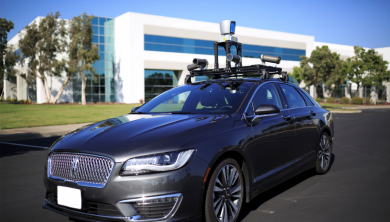One year old Pony.ai build autonomous car future
One year old Pony.ai raises $112 million
No that’s not a typo. Yes, that is larger than the median IPO fundraise last year. But few problems are as daunting as trying to build a fully autonomous car, particularly without the large resources of technology giants like Google, Uber, or Baidu behind you.
So for Pony.ai, which was founded a little more than a year ago in late 2016 by James Peng and Tiancheng Lou, the company decided to go crazy big, announcing today that it has closed on an $112 million Series A venture capital round to pursue their vision of a complete autonomous car solution, putting them almost instantly into the upper strata of competitors in the space.
The round was led by Morningside Venture Capital and Legend Capital, both large, early-stage, China-focused venture funds. Sequoia China, which led the seed round for the company, also participated.
Peng first got introduced to autonomous cars while working at Baidu, the Chinese search engine. He was the chief architect there, and when Baidu decided to launch an autonomous car project, he joined the project. The story is similarly for Lou, who in addition to being a savant programmer (he has won many international coding competitions over the years under the coding handle ACRush), worked at Google[x] on its autonomous car project before the unit became Waymo.
The two were both deeply excited about the future of autonomous cars, but the speed of execution at these large tech giants was much slower than they were willing to move. The two engineers realized that a nimble startup could ultimately move and iterate much faster on a solution. Thus was born Pony.ai.
Now, entrepreneurs have launched hundreds of autonomous vehicle-related startups over the past few years as the market has gotten more and more attention, particularly from public technology demonstrations from companies like Alphabet’s Waymo unit and Uber. The vast majority of those startups are hardware and software modules that fit into other platforms — think sensors, sensor fusion processors, and simulation models to test AI algorithms.
Peng and Lou’s ambition for Pony.ai wasn’t to build just parts though, but rather to go for a bigger dream: to bring together all of those disparate components into a fully-autonomous, level-four vehicle platform.
The reality though is that building an autonomous car is really, really hard, as Peng explained to me in an interview. “I think in the grand scheme of things the biggest challenge is still the uncertainty in the open driving environment,” he said. “Robots have been out there for 30-40 years, and most of them are working in somewhat confined environments. Vehicles themselves are like robots, but they have to operate in uncertain environments.”

16. Januar 2018
AUTOMAT VOR ORT: KONFERENZ AUTOMATICAR 2020
Am 16. September findet der Fachkongress AUTOMATICAR zum 2. Mal änlässlich der ...
»weiterlesenAUTOMAT vor Ort: Konferenz AUTOMATICAR
Am 12. April fand das erste Mal die von der Mobilitätsakademie des TCS organisierte ...
»weiterlesenAutomat vor Ort: EPTA Conference 2017
EPTA Conference 2017 „Shaping the Future of Mobility“ Luzern, Verkehrshaus, Mittwoch, 8. ...
»weiterlesenAuto-mat vor Ort: Automatische Shuttlebusse tpf
Am 22. September war www.auto-mat.ch live vor Ort, als die ersten beiden automatischen ...
»weiterlesen


